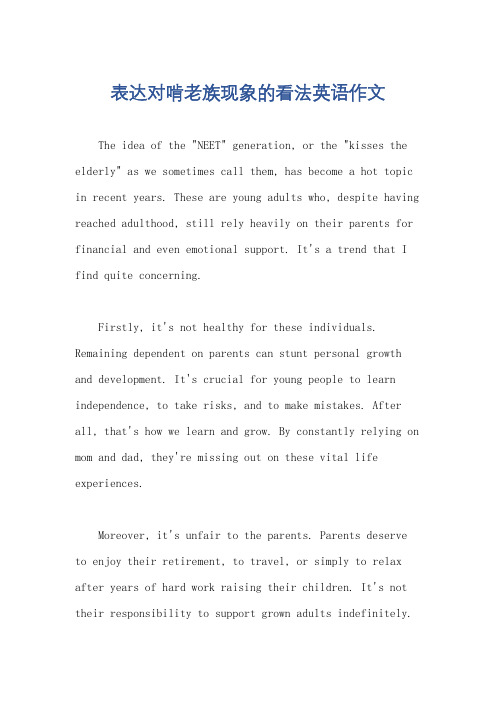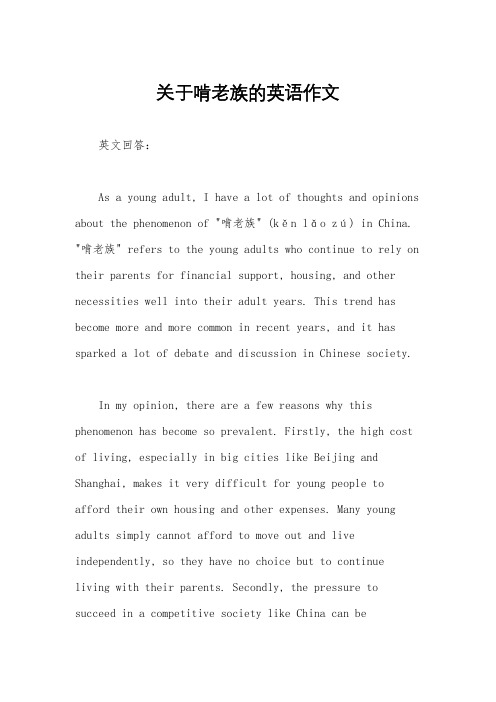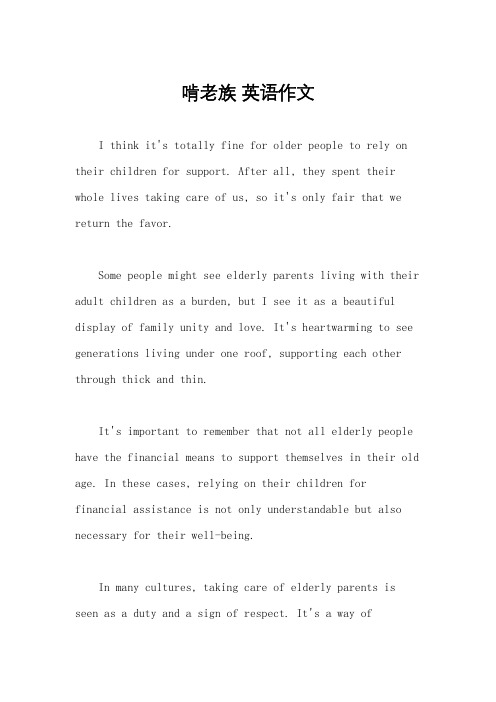最新大学英语四级作文范文: 我对“啃老族”的看法
表达对啃老族现象的看法英语作文

表达对啃老族现象的看法英语作文The idea of the "NEET" generation, or the "kisses the elderly" as we sometimes call them, has become a hot topic in recent years. These are young adults who, despite having reached adulthood, still rely heavily on their parents for financial and even emotional support. It's a trend that I find quite concerning.Firstly, it's not healthy for these individuals. Remaining dependent on parents can stunt personal growth and development. It's crucial for young people to learn independence, to take risks, and to make mistakes. After all, that's how we learn and grow. By constantly relying on mom and dad, they're missing out on these vital life experiences.Moreover, it's unfair to the parents. Parents deserve to enjoy their retirement, to travel, or simply to relax after years of hard work raising their children. It's not their responsibility to support grown adults indefinitely.It can also create tension and strain in family relationships, as parents may feel resentful or even ashamed of their child's lack of progress.From a societal perspective, the NEET phenomenon is also problematic. These individuals often lack the skills and experience needed to contribute product.。
大学英语作文啃老族

大学英语作文啃老族As a member of the "Kanglao" tribe, I think there are several reasons why some young people choose to rely on their parents for financial support well into adulthood.Firstly, the high cost of living, including housing, education, and healthcare, makes it difficult for young people to become financially independent. In many cases, the salaries of young graduates are not enough to cover these expenses, so they have no choice but to rely on their parents for support.Secondly, the competitive job market and unstable employment prospects also contribute to the phenomenon of "Kanglao". Many young people struggle to find stable and well-paying jobs, which makes it even harder for them to support themselves financially.Thirdly, the traditional Chinese value of filial piety means that many parents are willing to support their children for as long as they need it. In Chinese culture, it is seen as the responsibility of the parents to takecare of their children, and many parents are happy to continue providing for their adult children.In conclusion, the "Kanglao" phenomenon is a complexissue that is influenced by a variety of factors, including the high cost of living, the competitive job market, and traditional cultural values.作为“啃老族”的一员,我认为一些年轻人选择依赖父母在成年后依然经济上依赖父母有几个原因。
啃老族现象英文作文

啃老族现象英文作文The phenomenon of "Kanglao" (young adults who continueto rely on their parents for financial support) has become increasingly common in recent years. It seems that many young people are reluctant to leave the comfort of their parents' home and take on the responsibilities of adulthood.It's not just about living at home and enjoying a free ride. Many "Kanglao" individuals also expect their parentsto pay for their education, car, and even their leisure activities. This creates a huge financial burden for the parents, who are often struggling to support themselves as well.Some people argue that the high cost of living and low wages make it difficult for young people to becomefinancially independent. While this may be true to some extent, it's also important for young adults to takeinitiative and strive for financial independence.The "Kanglao" phenomenon also has psychological implications. It can create a sense of entitlement and dependency in young adults, making it difficult for them to develop a strong sense of self-reliance and resilience.Parents also play a role in perpetuating the "Kanglao" phenomenon. Some parents may feel guilty for not spending enough time with their children when they were young, so they overcompensate by providing financial support wellinto their children's adulthood.Ultimately, the "Kanglao" phenomenon reflects a broader societal issue. It highlights the challenges young people face in achieving financial independence and the complex dynamics of the parent-child relationship in modern society.。
啃老族作文范文英语

啃老族作文范文英语I think the concept of "kang lao zu" is quite interesting. It refers to the phenomenon of young people relying on their parents for financial support well into adulthood. Some people see it as a negative thing, but I think it's more complicated than that.Growing up, we were always told that we should strive to be independent and self-sufficient. But in today's society, with the rising cost of living and the unstable job market, it's not always easy for young people to makeit on their own. So it's not surprising that some choose to live with their parents for longer.Of course, there are also those who take advantage of their parents' generosity and refuse to take responsibility for themselves. They may be labeled as "kang lao zu," but I think it's important to consider the reasons behind their behavior. Maybe they lack the skills or confidence tostrike out on their own, or maybe they simply enjoy thecomfort and security of living at home.At the end of the day, I believe that each person's situation is unique and should be judged on its own merits. It's easy to criticize others for their choices, but we should try to understand where they're coming from before passing judgment. After all, family is supposed to be a source of support and love, not a reason for division and conflict.。
关于啃老族的英语作文

关于啃老族的英语作文Title: On the Issue of "Kanglaozu" (啃老族) in China。
In recent years, the issue of "Kanglaozu" (啃老族) has become a hot topic in China. "Kanglaozu" refers to thegroup of young adults who still rely on their parents for financial support and refuse to take responsibility fortheir own lives. This phenomenon has sparked heated debate among the public, with some criticizing "Kanglaozu" for being lazy and irresponsible, while others argue that the high cost of living and limited job opportunities are to blame.On the one hand, it is understandable that some young adults are struggling to make ends meet in today's society. The cost of living in many cities has skyrocketed, while salaries have not kept up with the pace. In addition, thejob market is highly competitive, and many young people are unable to find stable employment. Under these circumstances, it is not surprising that some choose to rely on theirparents for support.However, this does not justify the behavior of those who refuse to take responsibility for their own lives. "Kanglaozu" has become a derogatory term because it implies a lack of ambition and a sense of entitlement. Many young adults who fall into this category are not actively seeking employment or trying to improve their situation. Instead, they are content to live off their parents and avoid the challenges of the real world.Furthermore, the issue of "Kanglaozu" has broadersocial implications. China is facing a rapidly aging population, with a shrinking workforce and a growing number of retirees. If young adults continue to rely on their parents for support, this will put an even greater burden on the already strained social welfare system. Moreover, it will undermine the values of independence and self-reliance that are essential for a healthy society.To address this issue, both individuals and society as a whole need to take action. Young adults should beencouraged to take responsibility for their own lives, to seek out employment opportunities, and to develop theskills and knowledge needed to succeed in today's society. At the same time, the government should work to create a more favorable environment for job creation and entrepreneurship, while also providing support for those who are struggling to make ends meet.In conclusion, the issue of "Kanglaozu" is a complex and multifaceted one. While it is understandable that some young adults are struggling in today's society, it is important to recognize that relying on one's parents for support is not a sustainable solution. Instead, we need to work together to create a society that values independence, self-reliance, and hard work. Only then can we ensure a better future for ourselves and for future generations.。
关于啃老族的英语作文

关于啃老族的英语作文英文回答:As a young adult, I have a lot of thoughts and opinions about the phenomenon of "啃老族" (kěn lǎo zú) in China. "啃老族" refers to the young adults who continue to rely on their parents for financial support, housing, and other necessities well into their adult years. This trend has become more and more common in recent years, and it has sparked a lot of debate and discussion in Chinese society.In my opinion, there are a few reasons why this phenomenon has become so prevalent. Firstly, the high cost of living, especially in big cities like Beijing and Shanghai, makes it very difficult for young people toafford their own housing and other expenses. Many young adults simply cannot afford to move out and live independently, so they have no choice but to continueliving with their parents. Secondly, the pressure to succeed in a competitive society like China can beoverwhelming, and many young people feel like they need the support and stability of their parents in order to pursue their career goals.I personally know a few people who fit the description of "啃老族". For example, my friend Xiao Ming is 28 years old and still lives with his parents. He has a job, but he doesn't make enough money to afford his own place, so he continues to live at home. He often jokes that he is a member of the "啃老族", but deep down, I know that he feels embarrassed and frustrated by his situation.I think it's important to understand that the issue of "啃老族" is complex and multifaceted. On one hand, it's easy to judge and criticize young adults who rely on their parents for support, but on the other hand, we have to consider the economic and social factors that contribute to this trend. It's not just a matter of laziness or entitlement, but rather a reflection of the challenges that young people face in today's society.中文回答:作为一个年轻人,我对中国的“啃老族”现象有很多想法和看法。
啃老族 英语作文

啃老族英语作文I think it's totally fine for older people to rely on their children for support. After all, they spent their whole lives taking care of us, so it's only fair that we return the favor.Some people might see elderly parents living with their adult children as a burden, but I see it as a beautiful display of family unity and love. It's heartwarming to see generations living under one roof, supporting each other through thick and thin.It's important to remember that not all elderly people have the financial means to support themselves in their old age. In these cases, relying on their children forfinancial assistance is not only understandable but also necessary for their well-being.In many cultures, taking care of elderly parents is seen as a duty and a sign of respect. It's a way ofhonoring the sacrifices they made for us and showing our gratitude for everything they have done.At the end of the day, family is everything. As long as there is love and understanding between generations, it doesn't matter who is supporting whom. What matters is that we are there for each other, no matter what.。
啃老族看法英文作文

啃老族看法英文作文Title: Perspectives on "Kangaroo Generation" – A Debate on Adult Dependents。
In recent years, the phenomenon of adult children who continue to rely on their parents for financial support, colloquially termed "kangaroo generation" or "啃老族" in Chinese, has sparked intense debate and scrutiny. This trend challenges traditional notions of independence and self-sufficiency, raising questions about societal values, parental responsibility, and generational dynamics. Here, we delve into various perspectives surrounding this contentious issue.Firstly, proponents of the "kangaroo generation" argue that economic pressures, exacerbated by rising living costs and stagnant wages, make it increasingly difficult for young adults to achieve financial independence. In many cases, pursuing higher education incurs substantial debts, while entry-level jobs offer inadequate salaries to coverbasic living expenses. Consequently, adult children mayrely on parental support as a temporary measure until they can secure stable employment or establish their careers. From this viewpoint, parental assistance serves as a safety net, enabling young adults to navigate the uncertainties of early adulthood without succumbing to financial hardship.Conversely, critics contend that prolonged dependency fosters a sense of entitlement and undermines individual initiative. They argue that adult children who rely excessively on parental support may lack the motivation to strive for financial autonomy or pursue meaningful goals. Moreover, this dynamic can strain familial relationships, as tensions arise from unequal power dynamics and conflicting expectations. Critics emphasize the importance of fostering self-reliance and resilience in young adults, asserting that overcoming challenges independently fosters personal growth and character development.Another dimension of the debate centers on cultural and societal norms regarding filial piety and familial obligations. In many cultures, particularly in East Asia,the concept of filial piety entails a reciprocal relationship between parents and children, wherein children are expected to support their parents in old age as a form of gratitude for parental sacrifices. Consequently, some argue that parents who provide financial assistance totheir adult children are fulfilling their duty as caregivers, ensuring their children's well-being in an increasingly competitive and uncertain world. This perspective emphasizes the interdependence and mutual support inherent in familial relationships, transcending Western ideals of individualism.However, others caution against conflating filial piety with enabling dependency, warning of the potential consequences of perpetuating a cycle of reliance. They argue that while familial support is essential in times of need, it should be balanced with fostering independence and accountability. Furthermore, they advocate for cultivating a culture that values self-reliance while also providing a safety net for those facing genuine hardships, striking a delicate balance between support and autonomy.In conclusion, the issue of adult children relying on parental support elicits a range of perspectives rooted in economic, cultural, and familial considerations. While some view parental assistance as a pragmatic response to economic challenges, others caution against the pitfalls of prolonged dependency. Ultimately, navigating this complex terrain requires a nuanced approach that acknowledges the realities of contemporary economic pressures while also promoting principles of self-reliance and familial support. By fostering open dialogue and understanding, societies can strive towards solutions that empower young adults to navigate the complexities of adulthood with confidence and resilience.。
- 1、下载文档前请自行甄别文档内容的完整性,平台不提供额外的编辑、内容补充、找答案等附加服务。
- 2、"仅部分预览"的文档,不可在线预览部分如存在完整性等问题,可反馈申请退款(可完整预览的文档不适用该条件!)。
- 3、如文档侵犯您的权益,请联系客服反馈,我们会尽快为您处理(人工客服工作时间:9:00-18:30)。
大学英语四级作文范文:我对“啃老族”的看法
大学英语四级作文范文:我对”啃老族”的看法
题目要求
NEET problem is rampant all over the world as economic development slows down nowadays. How to solve this problem has become a hot issue for public debates. Read the excerpts carefully and write your response in about 200 words, in which you should:
1. summarize briefly the opinions about NEET;
2. give your comment.
Marks will be awarded for content relevance, content sufficiency, organization and language quality. Failure to follow the above instructions may result in a loss of marks.
A report indicating that one in eleven college graduates have been jobless for a year has raised public concern and caused heated discussions among the country’s Internet community.
The educationist
In a blog, Xiong Bingqi, vice-president of the 21st Century Education Research Center, quoted a “2012 Graduate Employment Report”, which showed that 570,000 of 6.8 million college graduates in 2011 remained jobless one year after graduation. Among them,
more than 100,000 neither go to school or work nor receive vocational skills and rely on support from their parents. This is known as the NEET (Not in Education, Employment or Training) group.
Xiong blamed university education for not preparing students for China’s fast-developing society and high demanding employers.
The lack of career planning and aimless job searching are two reasons why so many college graduates cannot get work, with many more developing a job-hopping habit, he said.
Netizens
Jack, head of an advertising agency:”Companies want to hire a person who can get the job done on the first day of work, but few graduates can. I was tired of listening to job applicants and how they obtained their first-class scholarships and successfully led the student union for four years, only to find out they do not know how to send a fax.”
Jingjin: “College graduates may know theories from books, but they don’t know how to put them into everyday work.”
Zhang Chunxia, who works for the career center of Beijing Foreign Studies University: “the facility has introduced courses on career planning and development. It has also invited alumni with
established careers to deliver speeches to prepare students.”
“I find those who work as university counselors and volunteer teachers, or start their own businesses are more confident than their peers as they know where their strengths lie.”
Wu Ying, a graduate of Beijing Foreign Studies University, returned school this September to pursue a master’s degree after being NEET for one year. She said: “It’s a vicious circle. You cannot find a job so you go back to school. Then you know less about the job market and still can’t get a job when you graduat e for the second time.”
Li Ming: Many college graduates who grew up post-1980s have a narrower definition of a “good job” than the older generation. Many would rather stay at home jobless if they failed to get stable or high-paid job.
Valderfield: “I was shocked when learning that more than 3,000 college graduates applied for a street cleaner’s job in Harbin, just to become an employee at a government-affiliated institution.”
Xiangzuounique: “If young people only consider government jobs as secure and decent, they lose an opportunity to enjoy life.”
Zhong Shan, a graduate from Fudan University: “I’m opting for a gap year after graduation as a buffer to job-hunting. I went to Sichuan Province in western China to teach rural children. It
enriches my experience, but the reality is that I still have to face the fierce competition in the labor market in the near future.”
Write your response on ANSWER SHEET FOUR.。
